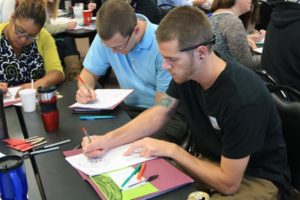Teaching BrainWise to Parents
Posted On: June 17, 2018 Christine Cerbana has been involved in parenting education for more than twenty years at Colorado State University where she served as director of a grant funded project providing training and technical assistance in developing parenting programs.
Christine Cerbana has been involved in parenting education for more than twenty years at Colorado State University where she served as director of a grant funded project providing training and technical assistance in developing parenting programs.
After leaving CSU, she formed Colorado Parenting Matters and continues to teach BrainWise, training educators whose work impacts parents, children, and youth. Christine is a gifted presenter, and conducts workshops not only in Colorado, but throughout the United States. Her workshops receive high praise from participants, and her joy and her passion for teaching BrainWise are reflected in the following interview. How to Teach BrainWise – The BrainWise Program
PGB: Trainers and instructors seldom see the outcomes of their work. Please share your amazing story about a training you conducted at a homeless shelter.
CC: I love to tell this story! I trained staff members who worked with homeless families at Angel House, a shelter in my town. Years later, I was looking for someone to install the trim around my microwave. The repairman sent to my home was very kind, and we chatted cordially as he worked on the trim. When given an opportunity, I always talk about BrainWise, and told him that I taught problem-solving skills, and gave him an example using the Wizard Brain and Lizard Brain.
He was stunned, and told me that three years ago, he and his family were homeless and living at Angel House. He said that learning BrainWise was the reason he was able to get back on his feet. “The Wizard Brain and Lizard Brain made sense,” he said, “and I vowed to change my life.” We both cried. BrainWise Program Method – Best Method to Teach Critical Thinking Skills
PGB: You are familiar with many intervention programs, but have said that BrainWise needs to be taught to everyone. What convinced you that it helps everyone?
CC: As a parenting educator, I tell parents two very important points: they need to be good role models and teach problem solving skills. I became a BrainWise champion in 2000 after I saw a group of kindergartners analyze stories using the 10 Wise Ways. I was blown away by how they understood what they were talking about! I knew it was a program that needed to be taught to as many people as possible, and made it a mandatory course for the educators and health professionals I taught. They became advocates in numerous counties at the schools and agencies where they taught.
BrainWise is so amazing in its ability to explain behaviors and responses; it helps five-year-olds and adults to understand how and when they can control their behavior. No other program explains complex concepts so that they are easy for everyone to understand. From that first demonstration I saw up to now, I continue to see how it helps us teach problem solving skills so that people use them. I remain impressed by how BrainWise is elegant in its simplicity.
PGB: Can you share some tips you would give instructors who are teaching BrainWise to parents?
CC: Parents can start teaching about the Constellation of Support by asking the child to identify who can help them, and reminding the child that asking for help from the right people helps them solve problems. Parents can integrate every Wise Way into actual problems the same way: ask the child to think about and assess a problem by applying one or more Wise Way. The beauty of BrainWise is that it is easy to connect all the Wise Ways, and parents quickly see that they can help children recognize that their Constellation of Support not only helps them use their Wizard Brain, it is connected to Red Flag warnings, Exit the Emotions Elevator, Separating Facts from Opinion and the other Wise Ways.
For example, to teach a child about making choices, I suggest giving him (or her) two realistic choices and asking, “What do you want to do?” Build on this by helping the child recognize that choices have consequences. If the child leaves his toys out and the dog chews them up, use it as a teachable moment. By continuously interacting with children using the 10 Wise Ways, parents help them learn to stop and think. Many parents don’t let their children make choices. This is a mistake! Children need to learn how to experience consequences of each choice.
Parents LOVE learning BrainWise! I see a consistent evolution take place: they learn so much and want to teach it to others. The 10 Wise Ways underlie and blend in with all the parenting principles we teach. We are giving tools that show instructors how to empower parents and help them understand why they are as important for them as they are for their children.
BrainWise Applications – Best Applications for Brain Development
********************
Parents who have never learned thinking skills are unable to teach them to their children. Parenting educators quickly recognize that the 10 Wise Ways help fill this gap, and many, like Christine, make BrainWise a required program. Recent partner Lisa Sabey (www.parentstoparents.org) is bringing her filmmaking skills and passion to help parents find resources. Her contribution will help us reach greater numbers.